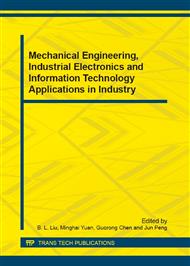[1]
Xin Xiang, Software Radio Principle and Technology, Xian: Xian electronic science and technology university, (2010).
Google Scholar
[2]
Jie Chen, Shaoqian Li and Chulin Liao, The Research of Spectrum Resource Allocation Algorithm Based on Demand in Cognitive Radio Network, Computer applications, vol. 28, A9, pp.2188-2191, (2008).
DOI: 10.3724/sp.j.1087.2008.02188
Google Scholar
[3]
Mo Li, Youyun Xu and Junquan Hu, A Q-Learning Based Sensing Task Selection Scheme for Cognitive Radio Networks, International Conference on Wireless Communication & Signal Processing, Nanjing, pp.1-5, (2009).
DOI: 10.1109/wcsp.2009.5371749
Google Scholar
[4]
Zhe Chen and Robert C. Qiu, Cooperative Spectrum Sensing Using Q-Learning with Experimental Validation, Proceedings of IEEE, pp.405-408, (2011).
Google Scholar
[5]
Y. B. Reddy, Detecting Primary Signals for Efficient Utilization of Spectrum Using Q-Learning, Procedings of the Fifth International Conference on Information Technology: New Generations, Las Vegas, pp.360-364, (2008).
DOI: 10.1109/itng.2008.95
Google Scholar
[6]
Ana Galindo-Serrano and L. Giupponi, Decentralized Q-learning for Aggregated Interference Control in Completely and Partially Observable Cognitive Radio Networks, Proccedings of the IEEE CCNC, pp.1-6, (2010).
DOI: 10.1109/ccnc.2010.5421826
Google Scholar
[7]
Cheng Wu, Kaushik Chowdhury and Marco Di Felice, Spectrum Management of Cognitive Radio Using Multi-agent Reinforcement Learning, Proceedings of the International Conference on Autonomous Agents and Multiagent Systems, pp.1705-1712, (2010).
Google Scholar
[8]
Yongjing Zhang, Zhiyong Feng and Ping Zhang ping, The Independent Joint Wireless Resource Management Algorithm Based on Q-learning, Journal of electronics and information, vol. 30, A3, pp.676-679, (2008).
Google Scholar
[9]
Mo Li, Youyun Xu and Yueming Cai, A Q-Learning Based Sensing Management Algorithm for Cognitive Radio System, Journal of electronics and information, vol. 32, A3, pp.623-628, (2010).
DOI: 10.3724/sp.j.1146.2009.00296
Google Scholar
[10]
Kok-Lim Alvin Yau, Peter Komisarczuk and Paul D. Teal, A Context-aware and Intelligent Dynamic Channel Selection Scheme for Cognitive Radio Networks, Proceedings of The 4th Iternational Conference on CROWNCOM, Hannover, pp.1-6, (2009).
DOI: 10.1109/crowncom.2009.5189427
Google Scholar
[11]
Kok-Lim Alvin Yau, Peter Komisarczuk, Paul D. Teal et al, Enhancing Network Performance in Distributed Cognitive Radio Networks using Single-Agent and Multi-AgnetReinforcement Learning, 2010 IEEE 35th Conference on Computer Networks, Denver, pp.152-159, (2010).
DOI: 10.1109/lcn.2010.5735689
Google Scholar
[12]
Yanjun Yao and Zhiyong Feng, Centralized Channel and Power Allocation for Cognitive Radio Networks: A Q-learning Solution, Proceedings of Future Network and Mobile Summit, Florence, pp.1-8, (2010).
Google Scholar


